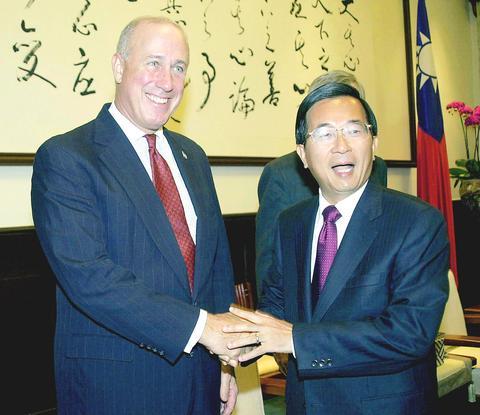The purpose of the "defensive referendum" is to maintain the status quo on both sides of the Taiwan Strait and has nothing to do with independence, President Chen Shui-bian (
Opposition parties have accused Chen of provoking China following his campaign promise last Saturday to hold a "defensive referendum" on the day of the presidential election. The international community has also speculated about whether Chen's "defensive referendum" is a concrete action toward Taiwanese independence.

PHOTO: REUTERS
peacemaking
Chen told foreign guests at a reception at the Presidential Office yesterday that the referendum is not meant to provoke, but is rather a way to make peace.
"I have to reaffirm that I will firmly maintain my `five noes' policy, which was revealed on May 20, 2000," Chen said.
"Like I have asserted many times before, any movement to deepen Taiwan's democracy, including the people's basic right to have a referendum and hastening the process to write a new constitution, will honor the five-noes promise. It would have no bearing on the independence-versus-reunification debate."
Chen said article 17 of the new Referendum Law (公民投票法), which refers to a "defensive referendum," can be used to strengthen a united country and would be highly effective in bringing foreign dangers to the public's attention.
psychological defense
"The lack of awareness about possible crises and enemy threats is one of the major problems in Taiwan. We must promote the concept of national defense as well as individuals' psychological defenses," Chen said.
He said that China still refused to denounce military action against Taiwan while it is continuing to buy more arms and increasing military expenditure, including the deployment of 496 ballistic missiles targeted at Taiwan.
"Every citizen of Taiwan should fully understand this serious case, and I must also appeal to all the countries in the Asia-Pacific region to squarely face China's threat, which poses a danger not only to Taiwan, but also to regional peace and stability," Chen said.
He said that the defensive referendum would be an effective means of letting China know what Taiwan's 23 million people are really thinking. According to Chen, most Taiwanese want peace.
status quo
"It is extremely important that Beijing should listen to Taiwan's mainstream public opinion. Therefore the goal of the defensive referendum is to protect the status quo in Taiwan," he said.
Chen made the remarks during a meeting with US Senator Jeff Bingman, who arrived in Taipei on Wednesday on a fact-finding mission concerning Taiwan's high-tech development and the nation's supply of and demand for energy.
During yesterday's meeting, Chen made a point of standing next to Douglas Paal, director of the American Institute in Taiwan, to allow the media to take pictures of them. Some Chinese-language media reported that Paal had been summoned back to Washington for a briefing on Taiwan's referendum controversy. According to these reports, this was a sign that the US is upset with Chen.

CHAOS: Iranians took to the streets playing celebratory music after reports of Khamenei’s death on Saturday, while mourners also gathered in Tehran yesterday Iranian Supreme Leader Ayatollah Ali Khamenei was killed in a major attack on Iran launched by Israel and the US, throwing the future of the Islamic republic into doubt and raising the risk of regional instability. Iranian state television and the state-run IRNA news agency announced the 86-year-old’s death early yesterday. US President Donald Trump said it gave Iranians their “greatest chance” to “take back” their country. The announcements came after a joint US and Israeli aerial bombardment that targeted Iranian military and governmental sites. Trump said the “heavy and pinpoint bombing” would continue through the week or as long

TRUST: The KMT said it respected the US’ timing and considerations, and hoped it would continue to honor its commitments to helping Taiwan bolster its defenses and deterrence US President Donald Trump is delaying a multibillion-dollar arms sale to Taiwan to ensure his visit to Beijing is successful, a New York Times report said. The weapons sales package has stalled in the US Department of State, the report said, citing US officials it did not identify. The White House has told agencies not to push forward ahead of Trump’s meeting with Chinese President Xi Jinping (習近平), it said. The two last month held a phone call to discuss trade and geopolitical flashpoints ahead of the summit. Xi raised the Taiwan issue and urged the US to handle arms sales to

State-run CPC Corp, Taiwan (CPC, 台灣中油) yesterday said that it had confirmed on Saturday night with its liquefied natural gas (LNG) and crude oil suppliers that shipments are proceeding as scheduled and that domestic supplies remain unaffected. The CPC yesterday announced the gasoline and diesel prices will rise by NT$0.2 and NT$0.4 per liter, respectively, starting Monday, citing Middle East tensions and blizzards in the eastern United States. CPC also iterated it has been reducing the proportion of crude oil imports from the Middle East and diversifying its supply sources in the past few years in response to geopolitical risks, expanding

Pro-democracy media tycoon Jimmy Lai’s (黎智英) fraud conviction and prison sentence were yesterday overturned by a Hong Kong court, in a surprise legal decision that comes soon after Lai was jailed for 20 years on a separate national security charge. Judges Jeremy Poon (潘兆初), Anthea Pang (彭寶琴) and Derek Pang (彭偉昌) said in the judgement that they allowed the appeal from Lai, and another defendant in the case, to proceed, as a lower court judge had “erred.” “The Court of Appeal gave them leave to appeal against their conviction, allowed their appeals, quashed the convictions and set aside the sentences,” the judges